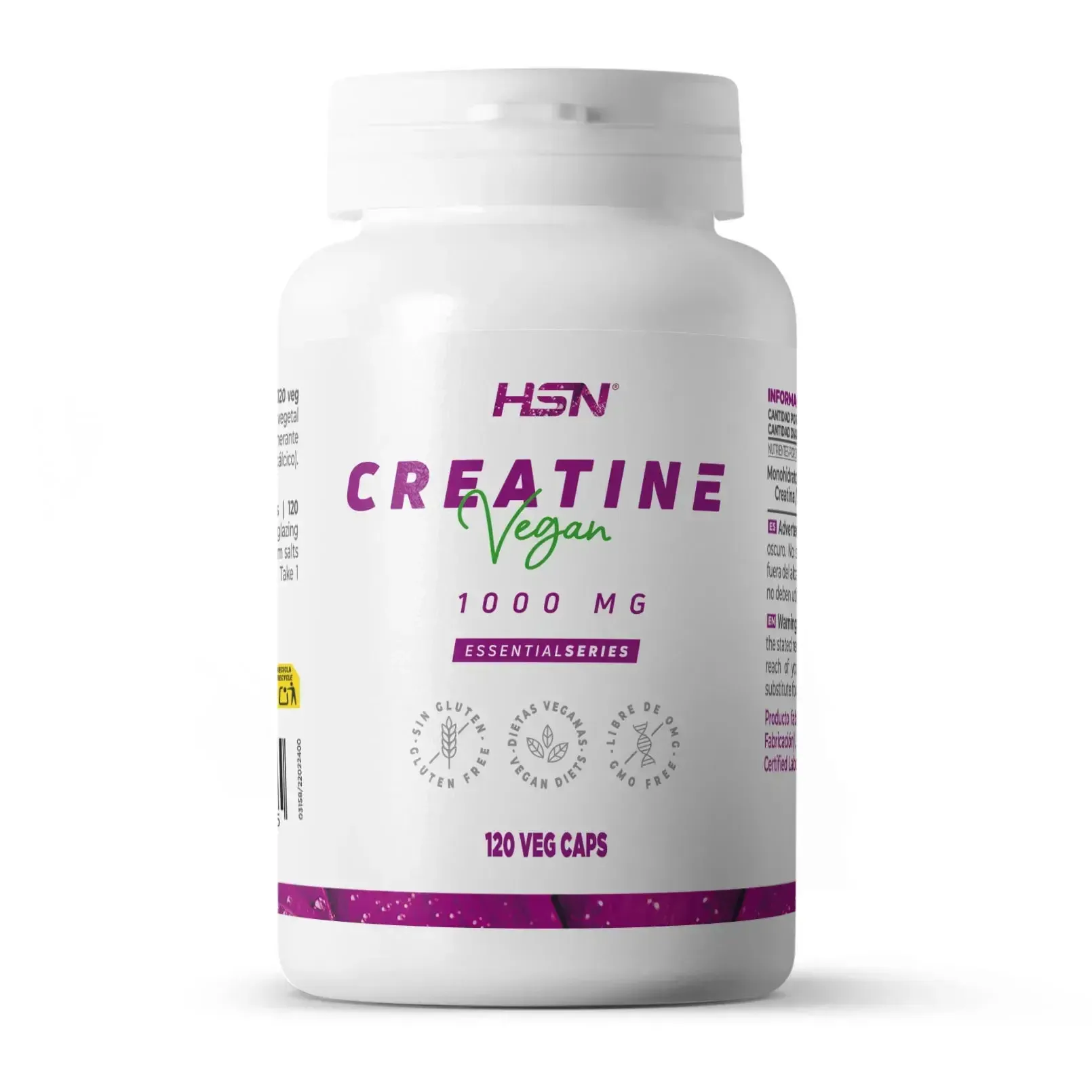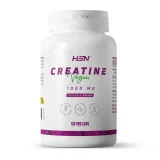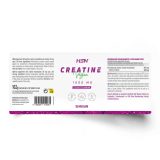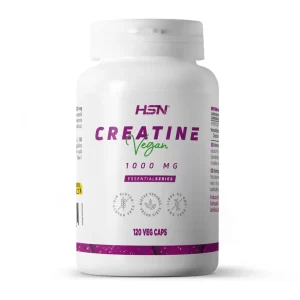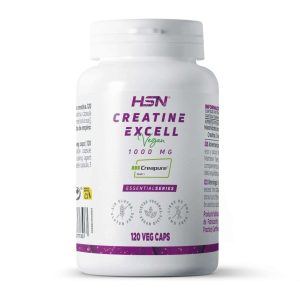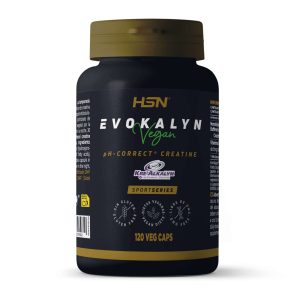- Creatine Monohydrate in vegetable capsules. High concentration (1000mg of creatine base per unit).
- Moderate size capsules. More convenient to use, easy to open.
- Raw material with purity report (100%) and absence of pollutants and degradation. Maximum quality!
- Suitable for vegetarian and vegan diets. Key supplement for people who do not eat meat.
- The highest purity and concentration for athletes. Supplement your diet with creatine monohydrate in capsules.
- Formula without the use of cosmetic additives. Free from colours. Transparent capsules.

A more convenient way to take your creatine
Creatine Monohydrate (1000mg Creatine) from EssentialSeries is a food supplement in vegetable capsules made from the most scientifically studied form of creatine: Creatine monohydrate. Each vegetable capsule provides the equivalent of 1000mg of Creatine base (88% of Creatine Monohydrate content).
Creatine Monohydrate is an environmentally stable form of Creatine, which is why it is so widely used in food supplements. Creatine is a small peptide, a structure composed of amino acids, namely L-arginine, glycine, and L-methionine. In the body, it is retained in association with a phosphate group, in the form of Phospho-Creatine.
This supplement is suitable for vegetarian and vegan diets, making it an excellent choice for plant-based diets, characterised by a lack of creatine intake through regular foods.
HSN Development – With all the guarantees of quality and safety

Completely safe for use by athletes. Compliance with WADA standards
Creatine monohydrate received, along with many other food supplements, an unjustified bad reputation in the 1980s. This was when the products were manufactured in America and were subject to appalling quality and safety controls. In addition, some athletes who used them tested positive in anti-doping tests.
The industry has evolved, and although this is no longer the case today, there may still be athletes who are afraid to take food supplements for these reasons.
At HSN we certify the origin of all our raw materials, to ensure, backed by external certifications that guarantee our manufacturing process, that all the food supplements in our catalogue are 100% free of any compound banned by competitive sports federations.
Creatine monohydrate is a completely safe and suitable compound for sports use, with a potential for effectiveness that no athlete should miss out on.
At HSN we guarantee safety and peace of mind for the athletes who use our products.
High purity – Raw material analysed to determine the percentage of purity and the absence of contaminants
The creatine monohydrate used for the development of our creatine monohydrate capsules is the same 200-mesh powder that we market in 100% pure RAW format as Creatine Monohydrate Powder.
Our creatine monohydrate powder from our RAW Series brand has been analysed by external laboratories that have issued reports with very positive evaluations on its purity levels and total absence of contaminants.
The creatine monohydrate in this product has been analysed and guaranteed as a raw material of the highest purity, equivalent to internationally recognised patents; and totally free of contaminants (such as DHT and DCD).
Intact creatine – No degradation to creatinine
When creatine loses a water molecule, it is susceptible to degradation to creatinine. This is why creatine monohydrate is recommended over anhydrous creatine for use as a food supplement, as it is more stable than other forms.
In the analysis of the purity and absence of contaminants in our creatine monohydrate, we asked the specialised laboratory to measure the creatinine levels of the raw material, to know what percentage of degradation our creatine monohydrate powder had.
The result was that no creatinine levels were detected in our raw material with a detection limit of 100 ppm (high sensitivity), which shows the excellent control of the manufacturing process and the preservation of the compound.
Creatine Monohydrate, the most effective and studied by science
Given its advantages, creatine monohydrate is the form most commonly used in the food supplement industry to provide an effective presentation of creatine. This is why it is the form used in the majority of scientific studies that have demonstrated efficacy with this compound.
Not only that but among the different forms of creatine that have been studied by science, monohydrate is the one that has been shown to be most effective.
Find the most effective way to supplement your diet with high-quality creatine!
Suitable for vegan diets | Free of animal ingredients

Creatine monohydrate capsules use a vegetable glazing agent.
And the rest of its ingredients are completely suitable for vegan diets, so the product itself is suitable for use by people who follow plant-based diets, without consumption of animal-based foods.
Creatine properties – What effects does it have on sport?
Creatine monohydrate is the number one food supplement studied by science, and is therefore considered a clear reference worldwide for its positive properties, among which are the following:
- Creatine improves physical performance in successive bursts of short-term, high-intensity exercise.
- Daily creatine intake may enhance the effect of endurance training on muscle strength in adults over 55 years of age.
Where can creatine be found in food? The importance of creatine supplementation
The main dietary source of creatine is meat, notably:
| FOOD | AMOUNT |
| Veal, provided that it is lean meat with low connective tissue content | 4.74-5.51g/kg |
| Chicken | 3.4g/kg |
| Rabbit | 3.4g/kg |
| Heart and entrails | 1.5-2.5g/kg |
According to data from the NHANES III study, the average intake of creatine from dietary sources in US adults is 1.08 g for men and 0.64 g for women; insufficient amounts to benefit from its positive sports properties.
Given the type of foods in which creatine is present, vegetarians and vegans lack a major source of creatine intake, which is why analyses show that people following diets free of animal products have lower levels.
For them, the use of creatine monohydrate in vegan capsules by HSN is ideal.
Creatine monohydrate bioavailability

Creatine monohydrate has excellent intestinal absorption and is considered the benchmark in this respect.
The stomach, because of its acidic environment, can degrade a small amount to creatinine, which is not absorbed, and for practical purposes does not seem relevant to any degree.
The overall bioavailability of creatine monohydrate is between 80 and 100%, depending on the dose used. The higher the dose, the less efficiently it is absorbed. Therefore, the amount recommended in our supplement is perfect.
We answer any questions you may have
Does creatine need a loading phase?
Creatine does not require a loading phase.
Although it is possible, and it brings the body to optimal phosphocreatine levels faster, digestive discomfort increases significantly with this practice. The result after several weeks of daily use, both training and rest days, is actually the same.
The use of creatine monohydrate does not require breaks.
I have read that I have to take 1 gram per 10kg of body weight, is this true?
According to the most significant scientific evidence, the recommended dose of creatine monohydrate is sufficient to benefit from it.
The dose of 1g of creatine per 10kg of body weight is a frequent recommendation but currently has not demonstrated additional properties over the 3g dose of creatine base that we recommend and also, this amount greatly increases digestive discomfort from creatine use.
Are there better forms of creatine?
No. Creatine monohydrate is the most studied and effective.
You can also use Kre-Alkalyn, which is buffered creatine monohydrate to cope with the small amounts that are degraded in the acidic environment of the stomach. Find it on HSN as Evokalyn.
What is the difference between this creatine and Creatine Creapure?
Creapure® is a registered trademark of creatine monohydrate, for all practical purposes our creatine monohydrate and Creapure® creatine monohydrate are the same substance, with the same (maximum) purity, absence of contaminants, same properties, and same potency.
Creapure® creatine monohydrate is available in powder and capsule formats.
Can creatine be used by a teenager doing high-performance physical exercise?
Yes.
Creatine has been shown to be safe and effective in teenagers. However, as the food supplements are developed for the adult population, we recommend bringing it to the attention of the teenager’s sports doctor so that he or she can assess its suitability for his/her diet and make any adaptations deemed necessary on a case-by-case basis.
Can an elderly person use creatine?
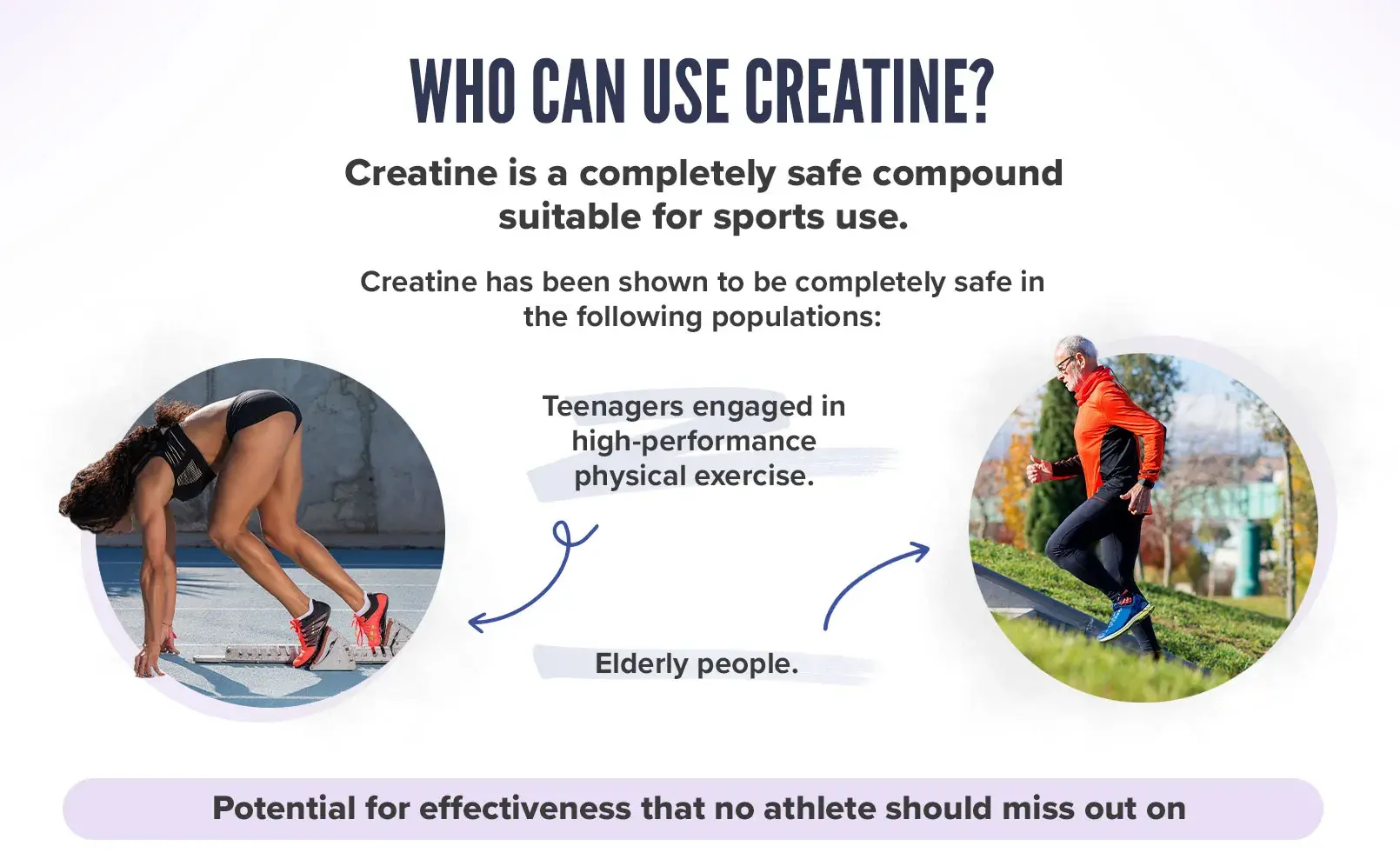
Yes.
Creatine is completely safe and recommended for the elderly and older people.
Find out more by reading this blog post!
Products to combine creatine monohydrate with for maximum effectiveness
Creatine can be combined with multiple products to obtain the greatest benefits. Some of the most common are Beta-Alanine, HMB, ALA, Betaine, or Carbohydrates.
The consumption of Creatine and Caffeine in the same intake is adequate and, based on what we currently know, does not lead to a loss of properties of either compound. At HSN we do not advise separating creatine and caffeine intakes for the time being, as everything seems to indicate that they are compatible with each other.
Bibliographical references
- Burt, V. L., & Harris, T. (1994). The third National Health and Nutrition Examination Survey: contributing data on aging and health. The Gerontologist, 34(4), 486–490.
- Avgerinos, K. I., Spyrou, N., Bougioukas, K. I., & Kapogiannis, D. (2018). Effects of creatine supplementation on cognitive function of healthy individuals: A systematic review of randomized controlled trials. Experimental Gerontology, 108, 166–173.
- Kreider, R. B., Kalman, D. S., Antonio, J., Ziegenfuss, T. N., Wildman, R., Collins, R., … Lopez, H. L. (2017). International Society of Sports Nutrition position stand Safety and efficacy of creatine supplementation in exercise, sport, and medicine. Journal of the International Society of Sports Nutrition, 14(1), 18.
- Mielgo-Ayuso, J., Calleja-Gonzalez, J., Marqués-Jiménez, D., Caballero-García, A., Córdova, A., & Fernández-Lázaro, D. (2019). Effects of creatine supplementation on athletic performance in soccer players: A systematic review and meta-analysis. Nutrients, 11(4).
- Post, A., Tsikas, D., & Bakker, S. J. L. (2019). Creatine is a conditionally essential nutrient in chronic kidney disease: A hypothesis and narrative literature review. Nutrients, 11(5).
The beneficial effect is obtained with a daily intake of 3 g of creatine.
This statement is intended for adults over 55 years of age who regularly engage in endurance training. The beneficial effect is obtained with a daily intake of 3 g of creatine in combination with endurance training, which allows an increase in workload over time and which should be performed at least three times a week for several weeks, at an intensity of at least 65-75 % of the one-repetition maximum load.

